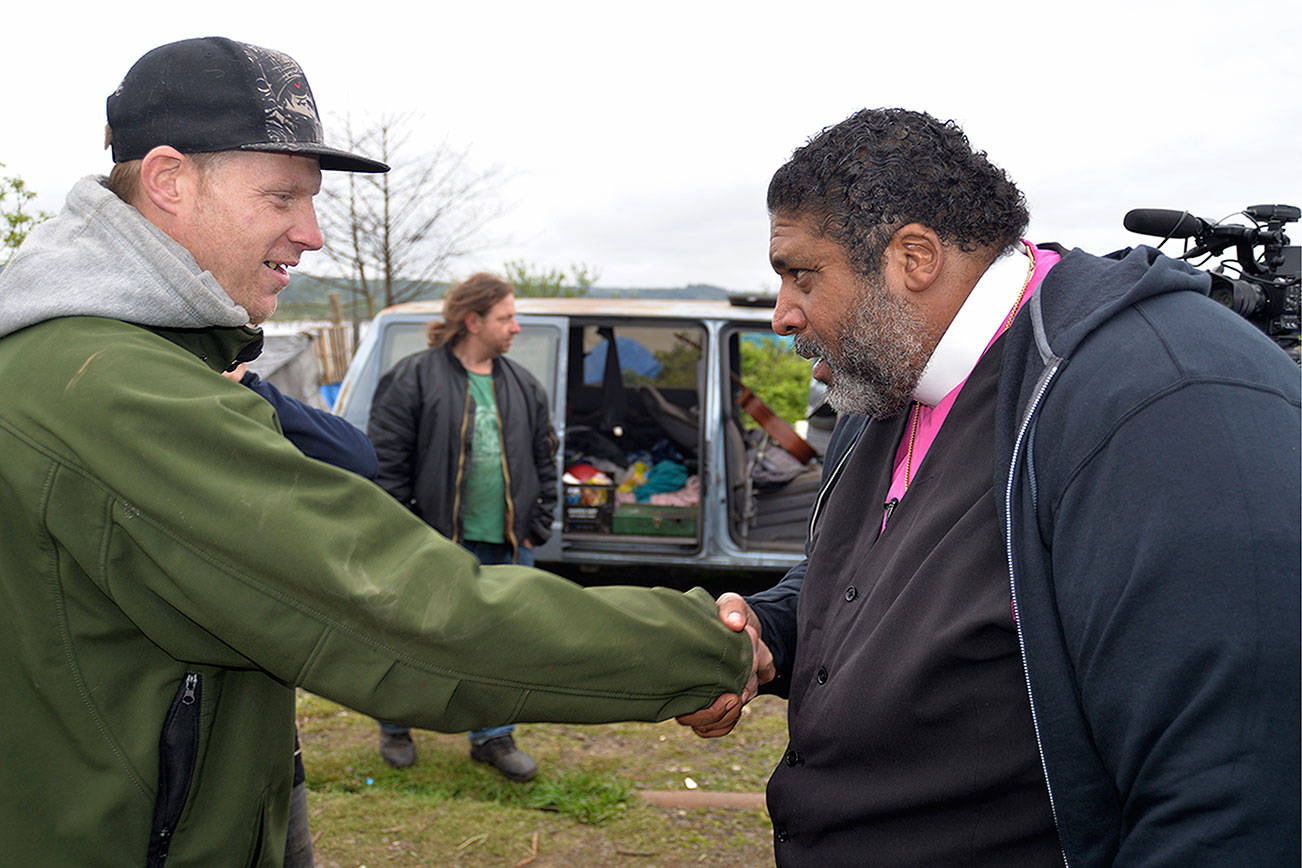Homelessness in Aberdeen and the rest of Grays Harbor has emerged as one of the most challenging issues locals face. A group that visited the city Tuesday brought with it a reminder that it’s also one of the most challenging facing the country. The organizers are looking to eliminate poverty nationwide and unite poor people around the country in order to push for economic justice.
Rev. Dr. William Barber II, a North Carolina activist and a national board member for the National Association for the Advancement of Colored People, visited the Chehalis River homeless camps Tuesday morning, his last stop on a tour of notably impoverished communities such as Detroit, and small communities in West Virginia, Kentucky and Mississippi. Barber is co-chair of the Poor People’s Campaign: A National Call for Moral Revival, inspired by Dr. Martin Luther King Jr.’s 1968 effort that bore the same name. That was cut short by King’s assassination. Barber’s effort looks to eliminate poverty, systemic racism, the war economy and ecological devastation.
“As we moved around the country, people would tell us about Aberdeen and Grays Harbor, and after hearing some things I’d think, ‘No way that’s true. That can’t be in America,’” said Barber.
Along with about 20 other volunteers from the Poor People’s Campaign and Chaplains on the Harbor, which invited the group, Barber strolled through a couple of the riverfront camps, listening to stories of how some people ended up living there in tents.
After a few minutes of observing the camp’s conditions and speaking with those who live there, Barber said he would want to bring a homeless person from Aberdeen with him to speak to Congress as part of a 40-day protest in both Washington D.C. and other state capitals beginning in mid-May.
“I want to show this to Congress, and juxtapose it with Alabama,” said Barber. “We cannot keep racializing this stuff. The racism, classism, all of it needs to be together.”
Barber would later lead a community meeting at St. Andrew’s Episcopal Church in Aberdeen, which featured a handful of homeless speakers and other community activists and health specialists.
More than 80 people showed up for the meeting, with many chanting protest songs as they waited, such as: “Everybody’s got a right to live, and before this Campaign fails, we’ll all go down to jail.”
There was a wide variety of points made at the meeting. Former Behavioral Health Resources worker Jamel Lewis reiterated how Grays Harbor leads Washington counties in overdose death rates in recent years, and Barber noted that more than 50 percent of all U.S. federal spending goes towards the military.
It was a raucous environment, with Barber gradually building to a booming voice by the end of his speech. Several religious leaders from Seattle, and Gregory Rickel, bishop of the Episcopal Diocese of Olympia, were here for the campaign’s visit.
Rev. Sarah Monroe, from Chaplains on the Harbor, has been working with the Poor People’s Campaign since it began several years ago, and said it was important to maintain efforts to address poverty as a national issue.
“My efforts are almost entirely focused locally, but what’s important with this campaign is people are struggling all over the country, and this is a way to connect efforts,” said Monroe. “What’s happening with poverty is not just local, and being part of a national conversation is important.”
While leaving the camp, Barber told The Daily World that the group’s efforts aren’t just to protest, but to create a more universal moral outrage about American poverty by getting the stories of poor and homeless people heard on a national level.
“Our movement is not just to have a big march and go home. It’s to create a platform where the people here can speak, give their voice,” he said. “We have to change the narrative in this country, and you can’t change it until we change the narrator. We had 26 presidential election debates, you didn’t hear anything about the people here, about poverty.”
Rev. Dr. Liz Theoharis, the Campaign’s other co-chair from New York who did not attend the Aberdeen meeting, said the effort is also looking to get the attention from those who aren’t poor, which they believe will also help shift the narrative.
“A lot of what this tour is, is getting this country to kind of weep and pay attention, to stop in its tracks to see what’s really happening, and how people are living,” said Theoharis. “Whether it’s in homeless encampments of Aberdeen, or Lowndes County, Alabama, where people are living with raw sewage in their yards, it’s to get people paying attention to that.”



